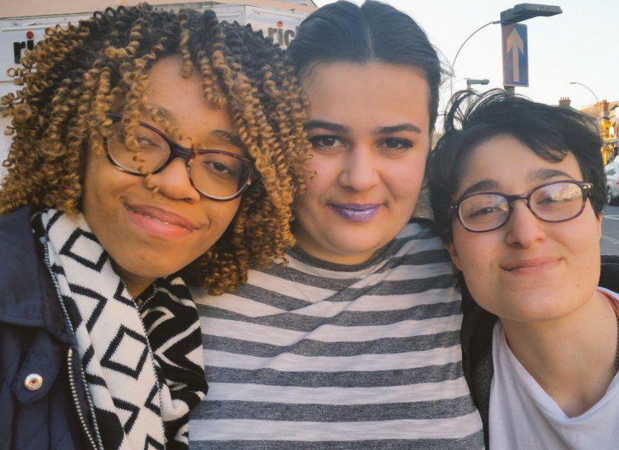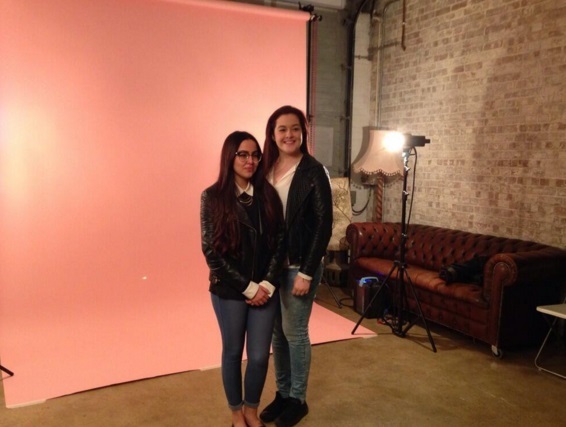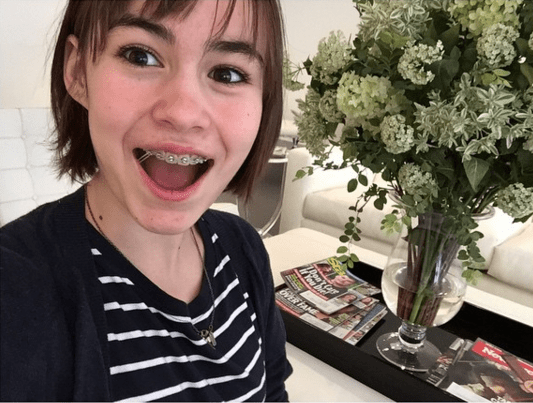The state of tomorrow lies in the hands of today’s teens, and we’re actually totally okay with that. That’s thanks to the inspiring work of some of the most tireless teen feminists out there, girls who aren’t afraid to call for change and make moves toward that progress themselves. While current high schoolers seem to get a bad rap for doing little more than pursuing the perfect selfie, these girls smash that stereotype to pieces with their concern for oppressed and mistreated groups around the globe. They’re helping all people who identify as women feel safer and more accepted through their essays, Twitter groups, apps and activist groups — before even graduating from college. Who knows what they’ll do in the next 10, 20, 30 years? We’ll be the first in line to find out.
courtesy Jules Spector
Jules Spector: Creating a Content Hub for Rethinking Girl Power
Feminist blogger wunderkind Jules Spector was only 13 when she launched Teen Feminist, one of the first and still most prominent one-stop hubs for youth seeking information and support on women’s rights. The blog’s topics range from fun — like feminist Halloween costumes — to globally conscious: one of Spector’s most championed causes is for girls to have equal access to education in developing countries. The hard-working teen told Mashable in 2014 that in addition to teenage girls seeking a feminist haven, Teen Feminist is really for everyone, “from people who know a lot about feminism and want to read a teenager’s perspective, to people who don’t know a lot about feminism but want to, or people who are totally anti-feminist and [the blog] is like, ‘You are wrong, and here’s why.'” In addition to writing on LGBT rights and the need to end child prostitution, Spector also offers up pop culture critiques, giving readers another way to look at the movies and TV shows they’re getting information from. Teen Feminist has led to Spector volunteering with LGBT centers, and interviewing Malala Yousafzai for an ABC documentary, and the discussion on her blog is still growing stronger every day.

courtesy Kalliope
Kalliope Jones: Rock Trio Questioning the Status Quo
Massachusetts high schoolers Isabella DeHerdt, Amelia Chalfant and Alouette Batteau make up a badass rock trio inspired by Haim and Aretha Franklin. They have the chops to be the Next Big Thing, but weren’t judged by those chops at a September Battle of the Bands. The band made headlines when they spoke out — strongly and smartly — against the judges’ deducting points from them because they weren’t “sultry” enough. The girls have shown incredible wisdom in calling for a total end to insanely outdated thinking like this in music and beyond, telling us “[Women] should have the same rights, and the same privileges, and be judged according to the same rules [as men]…The biggest issue is the patriarchal paradigm that our society seems to be holding on to. We’ve seen this paradigm play out in the music business first hand, so it is important to us to try to shift that paradigm both in our microcosm of a music universe and in the larger scene of things.” DeHerdt, Chalfant and Batteau plan to put their stances in action. “We can speak up,” Batteau says. “We can point it out when we see women and girls being discriminated against…We can refuse to accept that this is ‘the norm.'”

image via @reillzz
Reilly Wieland: Writing Her Way Out of the Patriarchy
Reading Wieland’s writings for outlets like Huffington Post or Smart Girls Group, it’s easy to forget she’s a teenager. She has the self-awareness to opine about the problem with white-focused feminism, and her Twitter feed makes you want to be best friends with her and talk all things girl power in the process. Speaking to Wieland, she says one of the most important issues she wants to work on is “rape culture and the prevalence of rape…I’m interested in consent and how I feel like most classic coming-of-age experiences I have with boys are like a strange transaction and consent feels like it must always be given, even when it’s not necessarily what I want.” The writer, who finds inspiration from the women in her family along with Tavi Gevinson, Carrie Brownstein and Arianna Huffington, has this to say to teens struggling with whether they identify as feminists: “Do you enjoy voting, being able to read and express yourself, owning your own land and not being beaten legally?…Well, welcome. You’re a feminist. We don’t bite! We are forever wearing an invisible ‘ask me about feminism’ pin, so use us a resource.”

image via @_TYFA
Lili Evans: Tweeting for the Global Feminist Army
Lili Evans’ causes encompass not only feminism as a whole, but body image and sexual consent, too — she’s lobbied parliament over a campaign she co-founded to increase and improve consent education in schools. At her own school, Evans has established a feminist society, and teaches “Feminism 101” workshops to spread the message in an open, constructive way. She’s proven her talent for uniting girls across the globe by setting up the Twitter Youth Feminist Army, a “network for feminists everywhere to support and encourage each other.” On the feed, Evans facilitates the exchange of articles and political happenings as well as the more casual, friendship-focused bonds and conversations of young feminists. Scrolling the timeline, you can find links and dialogues about everything from the pay gap and rape culture to transgender issues and reproductive rights.

courtesy Sana Sodki and Savannah Ali
Sana Sodki and Savannah Ali: Battling Everyday Misogyny
The way sexism affects teens on a day-to-day basis doesn’t always get the attention it should, even in the feminist discussion. London teens Sana Sodki and Savannah Ali have been working to change that. With their website, Oii My Size, the duo is tackling the problematic ways boys talk to girls. The whole catcalling thing, demanding a girl’s number, speaking about her like she’s a sex object — it’s all a violation of a girl’s rights, it’s dangerous, and it has to stop. Oii My Size gives girls a safe place full of information like why the language being thrown at them is wrong, and what they can do about it. The site is also aimed at educating boys to hopefully start changing their thinking. There’s even a section called Rate My Churpz! where boys can try out their pick-up lines and girls can rate them so both parties start to understand what’s okay and what’s not. Sodki and Ali address sexting on the site, and are working on an app to further that conversation.
Credits
Text Courtney Iseman
